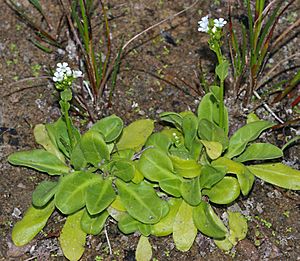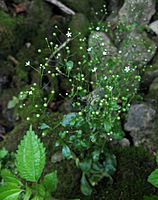Seaside brookweed facts for kids
Samolus valerandi is a small plant often called seaside brookweed or water pimpernel. It grows in many wet places around the world, including Europe, Africa, Asia, Australia, and the Americas. It's a tough little plant that can live in different kinds of wet areas.
Quick facts for kids Seaside brookweed |
|
|---|---|
 |
|
| Scientific classification |
|
| Kingdom: | Plantae |
| Clade: | Tracheophytes |
| Clade: | Angiosperms |
| Clade: | Eudicots |
| Clade: | Asterids |
| Order: | Ericales |
| Family: | Primulaceae |
| Genus: | Samolus |
| Species: |
S. valerandi
|
| Binomial name | |
| Samolus valerandi |
|
| Script error: The function "autoWithCaption" does not exist. | |
Script error: No such module "Check for conflicting parameters".
About This Plant
Samolus valerandi is a small plant that can grow up to about 35 centimeters (13.8 inches) tall. It has small white flowers that grow on long stalks. Each flower has five petals. This plant can make flowers for a long time, from spring all the way through fall. After the flowers, it grows small, round, green fruits called capsules.
Where It Lives
This plant loves wet places! You can find Samolus valerandi growing in many different watery spots. It lives along the banks of streams, in marshy areas near the ocean, and in places where water seeps out of the ground. It can grow well in both wild, natural areas and places that have been changed by people.
Growing This Plant
Samolus valerandi is a plant that you can grow in your garden, especially if you have wet areas. It's great for ponds, bog gardens, or any damp spot.
- Soil: This plant isn't too picky about soil. It can grow in sandy, loamy (a mix of sand, silt, and clay), or heavy clay soils. It prefers soil that is neutral or a bit alkaline (not too acidic).
- Sunlight: Samolus valerandi needs a lot of sunlight. It doesn't do well in shady spots, so pick a bright, sunny place for it.
- Water: It needs soil that is always moist or even wet. It can even grow directly in water!
- Salt Tolerance: This plant can handle salty air, so it's fine to grow it near the coast.
- Self-Fertile: It can produce seeds on its own, which means one plant can start new plants.
Sometimes, people try to grow Samolus valerandi in aquariums. However, it usually doesn't last very long when it's completely underwater.
 | Jessica Watkins |
 | Robert Henry Lawrence Jr. |
 | Mae Jemison |
 | Sian Proctor |
 | Guion Bluford |


